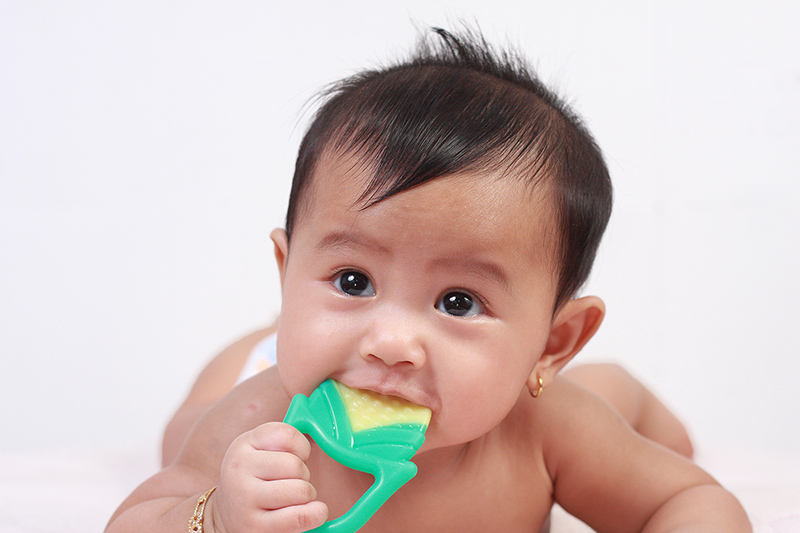Families For Life | Smile a Little Smile-Toddlers

Good oral hygiene starts from young. Here's how to make sure your baby has healthy teeth.
When do babies start teething?
Your baby is drooling so much that you have to change his bib frequently. He is also putting everything into his mouth to ‘chew’. He has swollen and red gums, flushed cheeks and his sleeping pattern seems disrupted. Nothing you do seems to help. He is grouchy, irritable and restless. These are common signs of teething.
A baby’s first tooth usually appears from about 6 months of age, though for some babies this may be earlier or later. The two lower front teeth (incisors) are the first to appear. The full set of baby teeth is usually visible in the mouth by the time he is about 3 years old. This set of teeth will start to be replaced by an adult set from around 6 - 7 years old.
How to ease the discomfort
A tooth pushing its way out of the gums can be uncomfortable. Since the process takes days, this can mean extended discomfort for your little one. Here are what you can do to make it less unpleasant for him:
Rub or massage his gums with clean fingers or a cold towel. This will help soothe the discomfort.
Cuddle and play with him to provide him with assurance and comfort and to distract him from the uncomfortable feeling.
Give your baby cool food and water to help numb the discomfort. For example, frozen fruits can be given in a baby feeder mesh bag to avoid risk of choking on chunks of food, done under adult supervision and with baby sitting or propped upright. Foods like chilled yogurt, blended peaches, and apple sauce can be more appetizing than warm or room-temperature foods, and can ease uncomfortable gums.
If your baby cannot be soothed, consult your doctor for some pain-relief medication.
Food and Drug Administration (FDA) advises against topical application of teething gels as they may contain agents harmful to children under 2 years old.
Symptoms like fever and diarrhoea are not often associated with teething. If your baby has the above-mentioned conditions for prolonged periods, please take him to a doctor.
Cultivating good oral habits from young
Milk teeth or baby teeth are important. They help your child to chew and speak properly. They also create space for the permanent teeth to erupt in the mouth. Healthy looking teeth are a tremendous boost to a child’s self-confidence and self-esteem.
Start your baby on good oral habits early. Begin by cleaning your baby’s gums daily from birth with a small piece of clean wet muslin cloth or a piece of gauze. This will help your baby get used to the daily routine of cleaning his teeth later on.
Brush your baby’s teeth as soon as they appear. Use a soft bristled toothbrush that is specially designed for babies. Remember to wipe the surface of his tongue as well, as milk or juice left there can cause tooth decay, plaque and bad breath. When your child can spit effectively between the ages of 18 months and 3 years, introduce a smear of adult strength (1000 ppm) fluoride toothpaste to help prevent tooth decay. For children below 18 months of age, use of the fluoridated toothpaste should depend on a child's risk of developing decay and as prescribed by a paediatric dentist.
It is important to cultivate the habit of brushing your baby’s teeth twice a day from young, once in the morning and once at night before sleeping. Having good oral hygiene practices from young will go a long way in keeping his teeth healthy in adulthood too.
Early childhood caries
Some parents give their babies a bottle of milk or sweetened beverage to drink while putting them to sleep. The milk or sweetened drink will pool around their teeth and cause tooth decay. This is called early childhood caries.
How to prevent early childhood caries:
After each feed, clean your baby’s teeth with a wet cloth or a clean, damp piece of gauze.
As soon as your baby’s first tooth appears, start brushing it. There is no need to use toothpaste at this stage.
By the time your child can spit effectively, use a smear of adult strength (1000ppm) fluoride toothpaste to brush his teeth.
Do not let your baby go to bed with a bottle of milk by the time he/she turns one year old. The liquid will pool in the mouth, creating a breeding ground for bacteria. This can lead to tooth decay. Try to put your child back to sleep at night with other means such as cuddling a favourite toy, or fingering the edge of a sleep suit. Dilute the milk if it is really needed.
Do not use a bottle of milk as a pacifier during the day, or let a toddler walk around with the bottle in his mouth.
Do not put any beverage (e.g. juice) other than water or milk in the bottle.
Teach your baby to drink from a cup as soon as he can hold one.
Transit your child to full cream milk by the time he turns 1 year old. Full cream milk is not as sweet as formula milk. Frequent consumption of sweetened beverage (e.g., formula milk, juice) in a milk bottle can cause severe tooth decay.
When your child turns 1 and wakes up frequently at night for milk, try to give your child plain water in a milk bottle or dilute the milk to make it less sweet.
Regularly lift your child's upper lip to check for white or brown spots, which are early signs of tooth decay.
Arrange regular dental checkups for your baby from as early as his first birthday.
Contributed by:
Health Promotion Board's Parent Hub